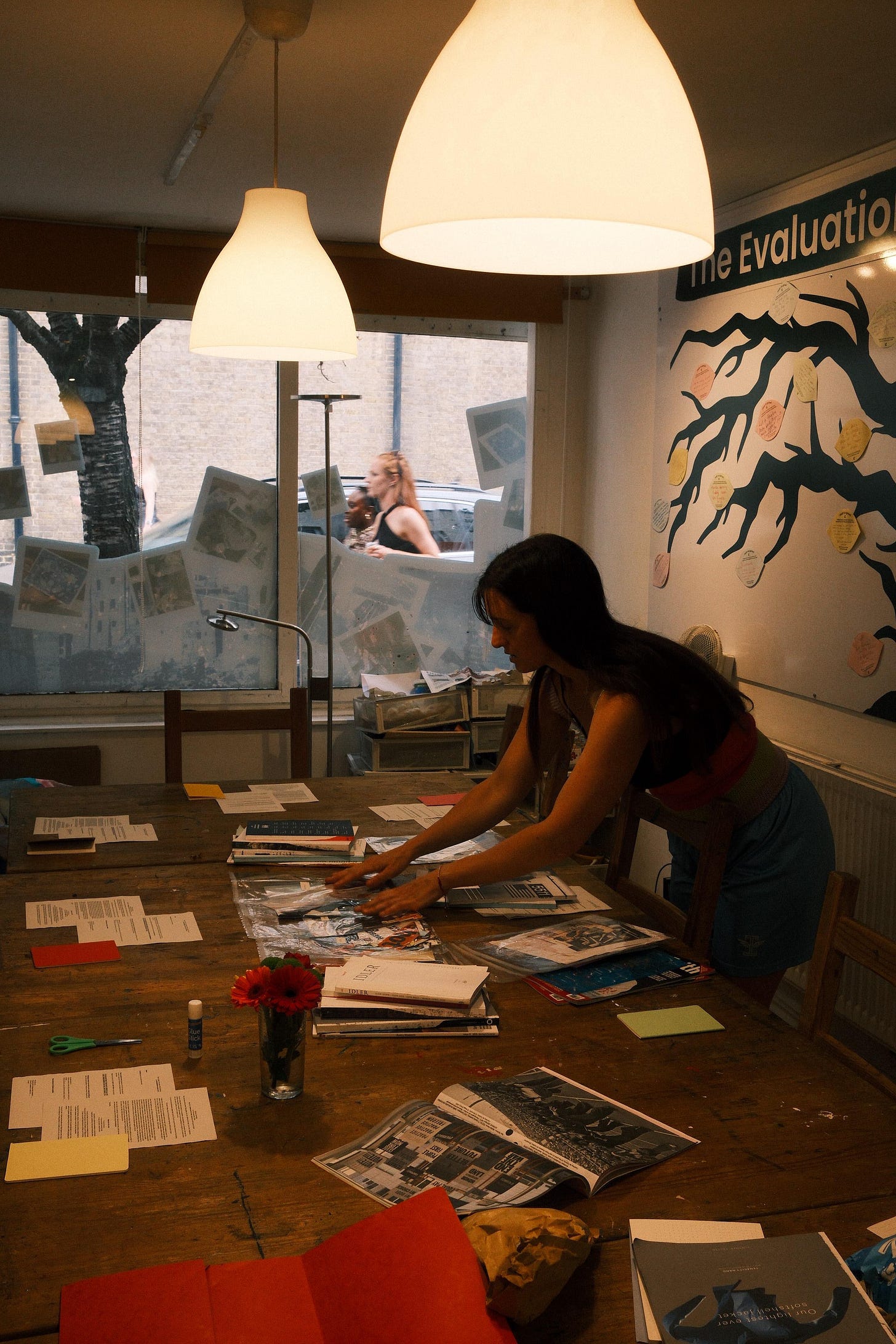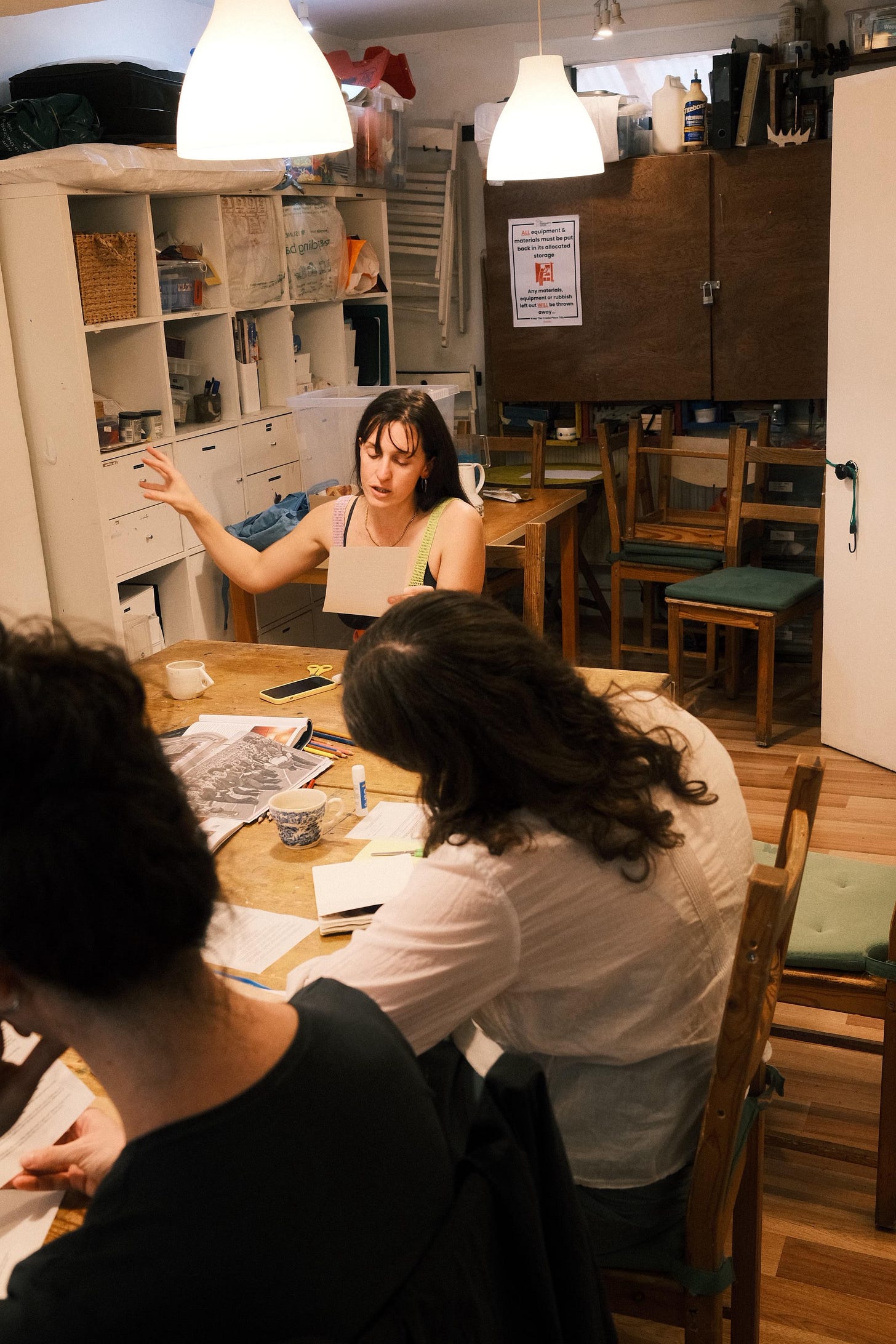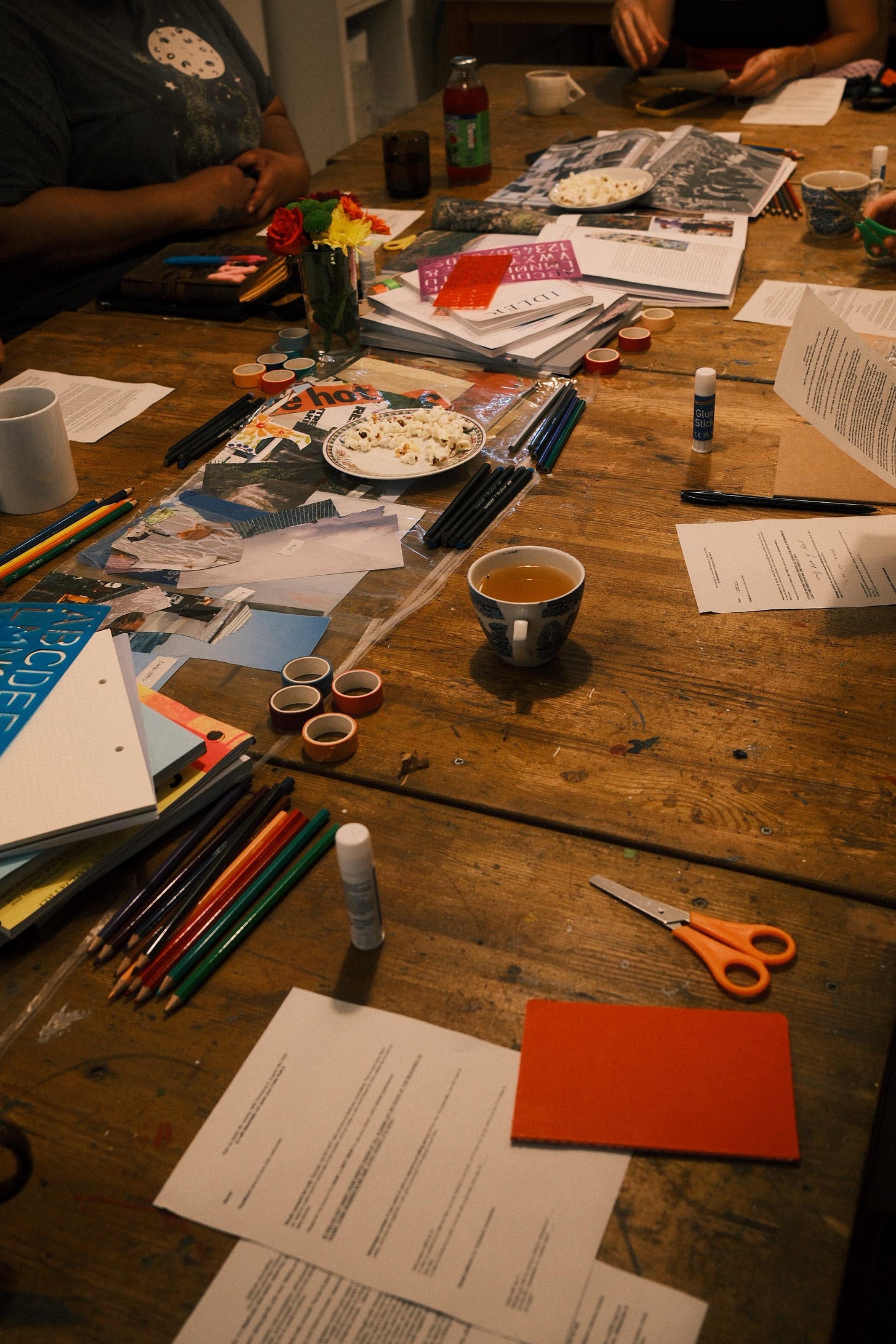Writing the Unwriteable: Softcore journaling + community arts
Documenting my summer '25 journaling workshop series
This year, I’ve been experimenting with stepping back from social media and focusing on hyper-local community*. As always, I have been approaching work and life as interconnected; two opportunities for embodied experience, if sometimes at odds with each other.
As both a sporty and arty person**, I’ve created two hyper-local communities for myself in the last year, with foci of football and craft. Each brings different things to my life. Football serves queer community, a locus around which to build fitness, queered ways of appreciating female physicality including my own, and reliability ~ we play even in the rain. Craft, for me, serves gentleness, softness, quiet, meditative time; time when it’s possible to drop the (not unhelpful) artifice of chat. I also like how I meet people of all ages and with very different life stories around craft tables.
I’m a writer and I love to write. In terms of work, I don’t think there’s anything that could quite compare for me to the excitement of working on a book project. It connects all areas of the mind, being a structural as well as imaginative project. Building something is a powerfully positive human experience, and book-building ignites that sense of production that I’m certain must be an evolved anticipation; those of us who love to build ~ build craft, build families, build shelter, build community ~ have survived carrying this happy trait.
But I’ve become increasingly aware I’m building alone. Days, particularly since losing my daughter, my little sidekick, my person to chat to, are so quiet. I went to therapy because of loss, partly to make space for grief and partly to work out how to make life worth living now it features such an enormous deficit. I realised I wanted to build with other people.
In ‘life’, I tried to connect ~ with anyone who would have me. I discovered quickly that the conversation rate from a social media connection was low, but that I remembered names that way and could sometimes reignite a connection down the line if we followed each other. Perhaps watching me be consistently human over time made me feel like a safer bet. But the greatest lesson I learned was to let go when it felt difficult to arrange a meet up someone (when your schedules keep missing each other or when they cancel a lot), and lean in when it felt easy. People who also want to make friends and have space in their life and think you’re the right pal for them will reach out in return and organise meet ups with no resistance.
In ‘work’ though, my days were still spent in silence, causing me to have to fill my evenings, to experience anxiety if I hadn’t booked anything in, and basically never to relax. I wanted to work with people, to have people in my days, and so I turned to the venue where I attended craft workshops most often, to see if perhaps I could run one.
For practitioners reading, this turned out to be as easy as it sounds and if I could offer advice it would be this ~ ask to talk to people, and then arrive with ideas and an open mind. I know now, from applying for Arts Council Funding (and receiving it to write a novel) that funding may come with conditions and that the person who is allocating it probably has to abide by a set of rules. So it was in this spirit that I met Sam, the Arts & Wellbeing producer at creative health charity St Margaret’s House. I brought a list of my own areas of interest, my pen, and my journal, which I opened to take notes, as I do every meeting.
Immediately, Sam pointed to my journal, asking, “Wait… what’s this?”
I have always journaled. I grew up in the 90s. This was, in fact, the reason I thought I might be able to run a workshop—crafts and interests I’ve participated in throughout my life because I did as a child, without being able to connect them to wider culture, were becoming mainstream. Of course, crochet has been in for a few years. Green politics. Environmentalism. Zine workshops were cropping up everywhere. I have always loved zines, but the idea that multiple workshops a week happen in British cities where everybody produces a zine by the end of the class blew my mind. What world was this? LA in the 00s? I’d only ever found zine culture in the US.
The first journal I remember having (although it can’t have been the first) was a Forever Friends Secret Diary. It had a lock, a hedgehog on the front, and my best friend had the same one. (So 90s, to have a best friend. She also had a dog and we went running through the countryside—for vibes, see Dead Girls or just imagine an adult sapphic couple.) I had a series of striped cover journals in my late teens. After visiting the New York Public Library’s Ehon exhibition in 2006, I got serious. I’d recently purchased a Windsor & Newton A5 portrait-oriented sketchbook and started to develop patterns in my journaling practice, for instance an introductory page***. I became way neater (if not actually neat).
I explained to Sam my current journaling practice: that I had one book in which to hold my whole current life, and this was it. It contained collages, drawings, dreams, diary entries, meeting notes, and handwritten scripts for the podcast I currently work on, that I read directly from while recording (you can see my journal on camera if you look at the desk in front of me in long shots). I showed him my use of certain prompts to create a way to stop myself thinking, as well as to start juices flowing so I could work out what to do with my year. He asked if I could build a workshop series around it.
Sometimes the right path is the absolute easiest path. I rejigged my old Instagram for my new workshop series, and what do you know, it already had several inspiring journaling posts on it amidst the 1000s of life posts back from times past when we didn’t have IG fatigue. I ordered the things I needed online without much thought. I wrote 8 syllabi, and created flyers on Canva uses photos of the 100s of old collages available to me from past journals.
Something Sam said inspired the title, Writing the Unwriteable, and I added Softcore Journaling, because I wanted some focus to be on softness, being gentle with ourselves. After my lived experiences of the past few years, I was done being hard and tough. I had realised that being soft meant that people could hurt you, but that was a good thing. That soft people feel hurt immediately and can retract from it. Tough people mistakenly see hurt as a flaw. They tamp it down and carry on in difficult situations. That was what I had done in past relationships, with both partners and friends. I now flinched from any meanness, and was all the better for it. Now, when I was harsh with myself, I noticed and went in another direction.
Each workshop has a syllabus, focusing on rewriting childhood and past narratives to be kinder to ourselves and each other. We look at boomer narratives like ‘letting go of the past’ and ask, ‘er, is that really possible without amnesia??’ We revisit childhood shame and notice what we know as adults that we didn’t know then.
Participants note often that they have used their journals only to rant or to document good days, rather than for introspection or exploration. They might journal religiously but have never collaged. Or, they use a journal for diary entries, but never for creative written work, or for jotting down the stuff of life ~ to do lists, meeting notes, etc. Last workshop, I also introduced the idea of a concept journal ~ a separate journal one creates for a limited time to express or examine a life theme.
We don’t typically share our journals in workshop. The idea is that working privately and personally in community will enable us to feel held without having to lay it all on the line, like some kind of martyrs to human connection. Vulnerable ~ but gentle, not rough. Protected, not raw.
I have now led 6 workshops. 3 have sold out. 2 are still bookable, although the 1st in September is almost sold out. When you attend a workshop, you can then be added to a casual journaling group that meets at cafes locally. I’m considering whether to keep running the more formal workshops in autumn ~ I’m working on a pretty tight writing schedule on three separate projects, plus I have some funding pitches to bash out for upcoming deadlines when I have a day or two.
What I’ve been so pleased about is our gently growing community. It feels like the football league — each workshop we see some regular attendees, some new; each feedback session we hear something that makes us connect, nod, express solidarity with each other. People have stayed talking for up to 20 minutes after we’ve finished. Last week, I had to switch the lights off and herd everybody out. How warm and cosy and gratifying to have created a space people don’t want to leave.
Thanks to journaling workshop attendees so far. Thank you to local marketing freelancer and photographer Sidney Bortolazzo for these beautiful photographs from our Saturday 16th August workshop at The Create Place (we don’t usually do photos at all, so a special thanks to all who were happy to be photographed).
You can book a ticket here to join us on Thursday 4th September 6.30-8.30pm and/or Saturday 13th September 3.30pm-5.30pm for £6 per workshop. Mini journals provided, or bring your own.
*A note on hyper-local online community ~ can Substack be this? Can Instagram be this, if my Instagram focuses more acutely on my work? Is hyper-locality about subject, as well as space? Is navigating to one URL, one app, a local experience?
**I didn’t think this was possible, as a school aged kid however, it has been a relief to find that I love football as much as craft, and enabled me to better fill my week with joy
***More on this another time.
Imbibing, currently:
Reread I’ll Be Gone In The Dark in one night ~ Michelle McNamara’s account of citizen sleuthing the (now solved) cold case of GSK / EAR / ONS killer. I haven’t reread anything in so long, and it blew my mind that I have books that are this good on my shelf. Sometimes I think I read something recent that everyone is hyping up and I think, “was that good? What is good?” Also it was such a comfort to basically know what was coming and that I was going to like the book because I’d kept it. Here’s to rereading and
the rewatch, Cool Runnings is as amusing and spirit-lifting now as it was as a child; my son got the dvd for his birthday;
also, we are reading the Moomins series and I’ve never read them before and they are awesome and unlike other 1950s lit, don’t feel sexist or racist, yay for lesbians writing children’s books;
A Beautiful Mess podcast will be broadcast every week now and I for one cannot wait;
and because usually I do one caffeinated beverage a day but I am on a two week break from optimal health, so many cups of builders tea it would be impossible to count, actually going to go pop the kettle on…





Glad they've been going so well, and I love Cool Runnings! John Candy's speech about how if you're not enough without something you'll never be enough with it is something I use to try and remind myself about things I want when I'm feeling incomplete.